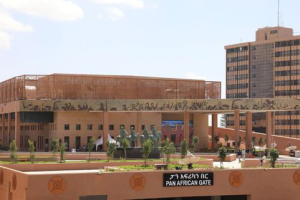Due to various reasons, the current state of civic engagement in the parliamentary procedure in the House of Peoples’ Representatives of the Federal Democratic Republic of Ethiopia (FDRE) leaves much to be desired, which indicates the country has a long way to go towards participatory and democratic governance, according to a document sent to The Ethiopian Herald by the House of Peoples’ Representatives of Ethiopia.
Since coming to power in 1991, the Ethiopian Peoples’ Revolutionary Democratic Front (EPRDF)-led government conducted six nationwide elections to institutionalize parliamentary democracy and participatory governance whereby citizens will have a say in government decision-making through their elected representatives.
However, since the political system has largely remained authoritarian and top-down with a single ruling party monopolizing state power for long, the ideals of representative democracy with the needs and concerns of the people being taken into consideration through their representatives have remained far from a reality, the document also revealed.
There have been some modest attempts by the current outgoing House to democratize its working process and enhance its scrutiny over the executive.
As everyone knows, parliament in principle is an embodiment of the will of the people. It is this will of the people that constitutes parliament to function on behalf of the people.
According to the aforesaid document, the legitimacy of parliament depends on the support and engagement of the electorate the primary function of any parliament: legislation is also improved in terms of quality when it is informed by citizens’ concerns, experiences and views. And, finally a parliament that is seen connected to citizens and is responsive to their concerns is in a good position to earn the trust of the people. Such arrangements in the discharge of parliamentary duties are generally anchored in constitutional/legal provisions.
The Constitution of the FDRE under article 8 sub article 1 and 3 stipulates that sovereign power resides in the Ethiopian people and their sovereignty shall be expressed through their elected representatives as well as their direct participation. Further in this regard, article 54 of the constitution and its sub article 2 affirm that members of the House are representatives of the Ethiopian people as a whole and in the discharge of their responsibilities they shall be governed, among other things, by the will of the people.
Furthermore, House’s Rules of Procedure and Members’ Code of Conduct of the House of Peoples’ Representatives similarly provide for public participation in the conduct of the core parliamentary functions and outlines aspects of the mechanism of engaging the public.
“The need for having active and engaged public is premised in the very nature of representative democracy which takes care of citizens’ concerns and demands through their elected deputies. Elected deputies to be able to, live up to expectations, need to always consult and be abreast of issues concerning their consistencies in particular and the country in general,” the document also stated.
The document further stated that this is all the more important especially in light of the fact that political systems in the modern world mainly rely on indirect democracy for the reason that the population and territorial size of states has made practicing direct democracy impossible despite modest attempts at grassroots level. Therefore, whatever the people would like to have executed is decided upon by their representatives. That does not mean, however, the people remain relegated. In this regard, the deficit in indirect participation is supposed to be filled by regularly engaging the public in parliamentary functions, according to an MP interviewed for the study. Besides filling the deficit in indirect participation, the MP contends, public engagement in parliamentary activities can be rationalized on the basis of its usefulness for quality legislation and informed oversight.
In a parliamentary system the legislature holds a special place. It is the parliament that makes government. It is also the parliament that breaks government; through, in this case, the vice versa is also possible. It is for this reason that the legislature is the locus of sovereign authority in parliamentary forms of government.
In Ethiopia, the House of Peoples’ Representatives is entrusted with the highest political authority as per article 50 (3) of the FDRE Constitution. In spite of this, a parliamentary system of government is known for the fusion of the executive and the legislative branches of government.
Potential adverse effects that may stem from its very nature are tamed by maintaining the constitutional division of power and a system of checks and balances. When both are adhered to in both principle and practice, the parliament stands out as the real sovereign from a political point of view. In a more pragmatic way, however, the parliament can be taken as the embodiment of the will of the people when it involves the public in the undertaking of its core functions, according to the document.
The Constitution of the FDRE stipulates that members of the parliament shall be guided by their conscience, the will of the people and the constitution in the undertaking of their duties. This implies that parliamentary activities shall always involve and be informed by public opinion.
The document also explained that engaging the public in the undertaking of parliamentary activities helps to ensure legitimacy, quality and trust. These essentials for any parliament can be realized when public engagement schemes are supported by an enabling political environment, institutional arrangements, physical and technological infrastructure, trained and skillful human resource and sufficient financial outlay.
Tadele Derseh, Ambassador for World Peace and Good Ethics, is Founder and Executive Director of Vision Ethiopian Congress for Democracy (VECOD). He said that parliament-civic societies’ organizations linkages have great importance for the overall development of one country.
In an interview with The Ethiopian Herald, Tadele stated that for many years in Ethiopia the attention given to the civic societies by the government was very little.
He also explained that, before the launch of the national reform in mid-2010 E.C (2018 G.C.), the government had been working to incapacitate the civic societies’ organizations by implementing repressive laws, instead of strengthening the associations and making them play their role.
He further noted that the government had also been establishing GONGOs (Government-Organized Non- Governmental Organizations) to weaken active civic societies’ organizations (CSOs).
The Charities and Societies Proclamation No. 621/2009, which has been replaced by Organizations of Civil Societies Proclamation No. 1113/2019, was a very oppressive for CSOs, according to him.
“The former proclamation was also hindering the activities of the CSOs and it severely weakened the CSOs,” he indicated.
At the request of the people and the CSOs, as well as the cooperation of the House of Peoples’ Representatives, a good and enabling proclamation has been issued, he also stated.
The positive beginnings of the House over the past three years in terms of engaging civil societies’ organizations are commendable, he said. But, he added, the parliament-CSOs linkage is not what it should be. “In this regard, there is much work to be done,” he insisted.
In order for the CSOs to play their role properly, the House must continue to intensify its work regarding involving the CSOs in the parliamentary activities and other related issues, he further urged.
He also urged that the CSOs should use the money, which they earn in various ways, for the intended purpose as they are non-profit organizations.
BY ABDUREZAK MOHAMMED
THE ETHIOPIAN HERALD 12 SEPTEMBER 2021





